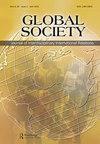跨国社会运动中的联盟动态——欧盟粮食政策联盟分析
IF 2.3
Q2 INTERNATIONAL RELATIONS
引用次数: 0
摘要
摘要在2020年后围绕欧盟共同农业政策进行政策讨论的背景下,欧洲各地的民间社会团体发起了旨在转变CAP和欧盟粮食系统的宣传活动。本文关注欧盟粮食政策联盟,这是一个议程广泛的多元化联盟。具有不同关注领域(包括环境、公共卫生和全球司法)的不同民间社会团体是如何组成一个可行且有凝聚力的倡导联盟,并为转型的粮食系统制定共同愿景的?这个以布鲁塞尔为主、以专业社区为中心的联盟如何让基层和良心社区参与倡导更可持续的粮食系统?我们发现,当联盟经纪人将不同的团体聚集在一起,建立在预先存在的联系和信任以及他们意识形态的趋同基础上时,一个多元化的联盟可以围绕一个共同的愿景动员起来。我们还发现,一个多元化的联盟涉及不同的社会运动社区,保持统一,并且当它作为一个分段、多中心和综合的网络得到良好的协调和组织时,它是有效的。这种组织结构允许联盟内部灵活参与和分散领导,同时围绕一系列关键规范保持统一的重点。本文章由计算机程序翻译,如有差异,请以英文原文为准。
Coalition Dynamics in Transnational Social Movements: Analyzing the EU Food Policy Coalition
ABSTRACT In the context of policy discussions surrounding the EU common agricultural policy in the period after 2020, civil society groups across Europe launched advocacy campaigns to transform the CAP and EU food systems. This article focuses on the EU Food Policy Coalition, a diverse coalition with a wide-ranging agenda. How did disparate civil society groups with different areas of focus that include the environment, public health, and global justice form a viable and cohesive advocacy coalition and develop a joint vision for a transformed food system? And how can this mostly Brussels-based coalition centred on a professional community engage grassroots and conscience communities in advocating for a more sustainable food system? We find that a diverse coalition can mobilise around a shared vision when a coalition broker brings diverse groups together, building on preexisting ties and trust and on the convergence of their ideologies. We also find that a diverse coalition engages different social movement communities, remains unified, and is effective when it is well-coordinated and organised as a segmentary, polycentric, and integrated network. This organisational structure allows for flexibility in participation and for dispersed leadership within the coalition, while keeping a unified focus around a set of key norms.
求助全文
通过发布文献求助,成功后即可免费获取论文全文。
去求助
来源期刊

Global Society
INTERNATIONAL RELATIONS-
CiteScore
3.10
自引率
6.20%
发文量
32
期刊介绍:
Global Society covers the new agenda in global and international relations and encourages innovative approaches to the study of global and international issues from a range of disciplines. It promotes the analysis of transactions at multiple levels, and in particular, the way in which these transactions blur the distinction between the sub-national, national, transnational, international and global levels. An ever integrating global society raises a number of issues for global and international relations which do not fit comfortably within established "Paradigms" Among these are the international and global consequences of nationalism and struggles for identity, migration, racism, religious fundamentalism, terrorism and criminal activities.
 求助内容:
求助内容: 应助结果提醒方式:
应助结果提醒方式:


